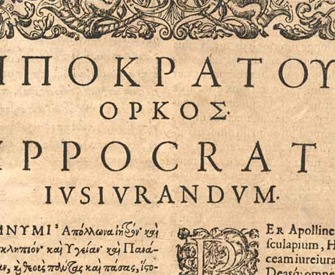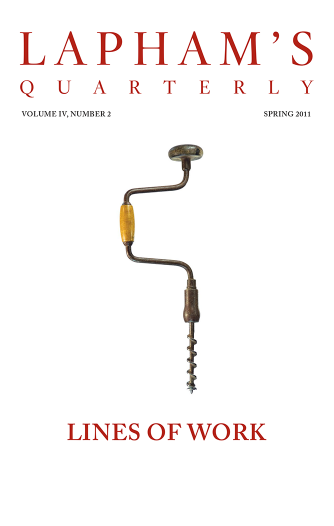Menenius Agrippa: What work’s, my countrymen, in hand? Where go you
With bats and clubs? The matter? Speak, I pray you.
Citizen: Our business is not unknown to the senate: they have had inkling this fortnight what we intend to do, which now we’ll show ’em in deeds. They say, poor suitors have strong breaths: they shall know, we have strong arms too.
Menenius: Why, masters, my good friends, mine honest neighbors,
Will you undo yourselves?
Citizen: We cannot, sir; we are undone already.
Menenius: I tell you, friends, most charitable care
Have the patricians of you. For your wants,
Your suffering in this dearth, you may as well
Strike at the heaven with your staves as lift them
Against the Roman state, whose course will on
The way it takes, cracking ten thousand curbs
Of more strong link asunder than can ever
Appear in your impediment. For the dearth,
The gods, not the patricians, make it; and
Your knees to them, not arms, must help. Alack!
You are transported by calamity
Thither where more attends you; and you slander
The helms of the state, who care for you like fathers,
When you curse them as enemies.
Citizen: Care for us! True, indeed! They never cared for us yet—suffer us to famish, and their storehouses crammed with grain; make edicts for usury, to support usurers; repeal daily any wholesome act established against the rich, and provide more piercing statutes daily to chain up and restrain the poor. If the wars eat us not up, they will; and there’s all the love they bear us.
Menenius: Either you must
Confess yourselves wondrous malicious,
Or be accused of folly. I shall tell you
A pretty tale: it may be you have heard it;
But, since it serves my purpose, I will venture
To stale’t a little more.
Citizen: Well, I’ll hear it, sir, yet you must not think to fob off our disgrace with a tale: but, an’ it please you, deliver.
Menenius: There was a time, when all the body’s members
Rebelled against the belly; thus accused it—
That only like a gulf it did remain
In the midst of the body, idle and unactive,
Still cupboarding the viand, never bearing
Like labor with the rest; where the other instruments
Did see and hear, devise, instruct, walk, feel
And, mutually participate, did minister
Unto the appetite and affection common
Of the whole body. The belly answered—
Citizen: Well, sir,
What answer made the belly?
Menenius: Sir, I shall tell you. With a kind of smile,
Which never came from the lungs, but even thus—
For, look you, I may make the belly smile,
As well as speak—it tauntingly replied
To the discontented members, the mutinous parts
That envied his receipt; even so most fitly,
As you malign our senators, for that
They are not such as you.
Citizen: Your belly’s answer? What!
The kingly crowned head, the vigilant eye,
The counselor heart, the arm our soldier,
Our steed the leg, the tongue our trumpeter,
With other muniments and petty helps
In this our fabric, if that they—
Menenius: What then?—
’Fore me, this fellow speaks! What then? What then?
Citizen: Should by the cormorant belly be restrained,
Who is the sink of the body—
Menenius: Well, what then?
Citizen: The former agents, if they did complain,
What could the belly answer?
Menenius: I will tell you:
If you’ll bestow a small—of what you have little—
Patience awhile, you’ll hear the belly’s answer.
Citizen: Ye’re long about it.
Menenius: Note me this, good friend;
Your most grave belly was deliberate,
Not rash like his accusers, and thus answered:
“True is it, my incorporate friends,” quoth he,
“That I receive the general food at first,
Which you do live upon; and fit it is,
Because I am the storehouse and the shop
Of the whole body: but, if you do remember,
I send it through the rivers of your blood,
Even to the court, the heart, to the seat of the brain;
And through the cranks and offices of man,
The strongest nerves, and small inferior veins,
From me receive that natural competency
Whereby they live; and though that all at once,
You, my good friends”—this says the belly, mark me—
Citizen: Ay, sir; well, well.
Menenius: “Though all at once cannot
See what I do deliver out to each,
Yet I can make my audit up, that all
From me do back receive the flour of all,|
And leave me but the bran.” What say you to it?
Citizen: It was an answer. How apply you this?
Menenius: The senators of Rome are this good belly,
And you the mutinous members: for examine
Their counsels and their cares; digest things rightly,
Touching the weal o’ the common, you shall find,
No public benefit which you receive
But it proceeds or comes from them to you,
And no way from yourselves. What do you think,
You, the great toe of this assembly?
Citizen: I the great toe? Why the great toe?
Menenius: For that, being one of the lowest, basest, poorest
Of this most wise rebellion, thou goest foremost:
Thou rascal, that art worst in blood to run,
Lead’st first to win some vantage.
But make you ready your stiff bats and clubs:
Rome and her rats are at the point of battle;
The one side must have bale.
From Coriolanus. While Shakespeare relied on Plutarch’s Parallel Lives as the source for the plot of his play about the legendary Roman soldier and statesman, he derived Menenius’ speech about the body politic from William Camden’s Remains of a Greater Work Concerning Britain. In it Pope Adrian IV states that a good government is like a body in which “all parts performed their functions—only the stomach lay idle and consumed all.” Shakespeare composed the tragedy around 1608; it was among his last plays.
Back to Issue


